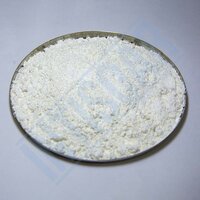Zeolite, a naturally occurring mineral, offers several benefits for landscaping and garden design. Its unique properties make it a valuable addition to soil amendments and horticultural applications. Zeolite can offer several benefits when used for flowers and ornamental plants. Here are some ways zeolite can positively impact their growth and overall health:
Improved Nutrient Retention: Zeolite has a high cation exchange capacity (CEC), allowing it to absorb and retain essential nutrients in the soil. When incorporated into the growing medium or used as a soil amendment, zeolite can hold onto nutrients like nitrogen, phosphorus, potassium, and trace minerals. It slowly releases these nutrients to the roots of flowers and ornamental plants, providing a steady supply throughout their growth cycle. This promotes healthier foliage, vibrant blooms, and overall plant vigor.
Enhanced Water Management: Zeolite's porous structure enables it to absorb and retain water, acting as a reservoir that can slowly release moisture to plants as needed. This can be particularly beneficial for flowers and ornamental plants, as it helps to maintain consistent soil moisture levels. Zeolite reduces the risk of both underwatering and overwatering, ensuring that the plants receive adequate hydration without becoming waterlogged. Improved water management leads to healthier root systems, stronger growth, and more beautiful flowers.
pH Regulation: Zeolite possesses buffering properties that help stabilize soil pH levels. It can absorb excess acidity or alkalinity, maintaining a more neutral pH range suitable for flowers and ornamental plants. Proper pH levels are crucial for nutrient availability and uptake. Zeolite's ability to regulate soil pH ensures that essential nutrients are readily available to the plants, promoting optimal growth and vibrant flower coloration.
Reduction of Fertilizer Use: Zeolite's nutrient retention capabilities can reduce the frequency and amount of fertilizers required for flower and ornamental plant cultivation. By holding onto nutrients and preventing their leaching, zeolite ensures that the applied fertilizers remain accessible to the plants for a more extended period. This not only saves time and effort but also minimizes the risk of nutrient runoff and pollution.
Improved Soil Structure: Zeolite can contribute to improved soil structure by promoting better aeration and drainage. Its porous nature allows air to circulate through the soil, preventing compaction and facilitating root respiration. Zeolite also helps to break up heavy clay soils, allowing for better water penetration and root development. Healthy soil structure is essential for healthy flower and ornamental plant growth.
Environmental Friendliness: Zeolite is a natural mineral and does not pose any harm to the environment. Its use in flower and ornamental plant cultivation aligns with sustainable gardening practices. Zeolite's water-saving properties contribute to water conservation efforts, and its ability to reduce fertilizer use minimizes the potential for nutrient runoff and water pollution.
When using zeolite for flowers and ornamental plants, it's important to consider the specific requirements of each plant species, as well as the existing soil conditions. Consult with local gardening experts or horticultural resources to determine the appropriate zeolite application rates and methods for optimal results. More information on Zeolite you can obtain on : https://intisoar.co/
Improved Nutrient Retention: Zeolite has a high cation exchange capacity (CEC), allowing it to absorb and retain essential nutrients in the soil. When incorporated into the growing medium or used as a soil amendment, zeolite can hold onto nutrients like nitrogen, phosphorus, potassium, and trace minerals. It slowly releases these nutrients to the roots of flowers and ornamental plants, providing a steady supply throughout their growth cycle. This promotes healthier foliage, vibrant blooms, and overall plant vigor.
Enhanced Water Management: Zeolite's porous structure enables it to absorb and retain water, acting as a reservoir that can slowly release moisture to plants as needed. This can be particularly beneficial for flowers and ornamental plants, as it helps to maintain consistent soil moisture levels. Zeolite reduces the risk of both underwatering and overwatering, ensuring that the plants receive adequate hydration without becoming waterlogged. Improved water management leads to healthier root systems, stronger growth, and more beautiful flowers.
pH Regulation: Zeolite possesses buffering properties that help stabilize soil pH levels. It can absorb excess acidity or alkalinity, maintaining a more neutral pH range suitable for flowers and ornamental plants. Proper pH levels are crucial for nutrient availability and uptake. Zeolite's ability to regulate soil pH ensures that essential nutrients are readily available to the plants, promoting optimal growth and vibrant flower coloration.
Reduction of Fertilizer Use: Zeolite's nutrient retention capabilities can reduce the frequency and amount of fertilizers required for flower and ornamental plant cultivation. By holding onto nutrients and preventing their leaching, zeolite ensures that the applied fertilizers remain accessible to the plants for a more extended period. This not only saves time and effort but also minimizes the risk of nutrient runoff and pollution.
Improved Soil Structure: Zeolite can contribute to improved soil structure by promoting better aeration and drainage. Its porous nature allows air to circulate through the soil, preventing compaction and facilitating root respiration. Zeolite also helps to break up heavy clay soils, allowing for better water penetration and root development. Healthy soil structure is essential for healthy flower and ornamental plant growth.
Environmental Friendliness: Zeolite is a natural mineral and does not pose any harm to the environment. Its use in flower and ornamental plant cultivation aligns with sustainable gardening practices. Zeolite's water-saving properties contribute to water conservation efforts, and its ability to reduce fertilizer use minimizes the potential for nutrient runoff and water pollution.
When using zeolite for flowers and ornamental plants, it's important to consider the specific requirements of each plant species, as well as the existing soil conditions. Consult with local gardening experts or horticultural resources to determine the appropriate zeolite application rates and methods for optimal results. More information on Zeolite you can obtain on : https://intisoar.co/
Attachments
Last edited:

